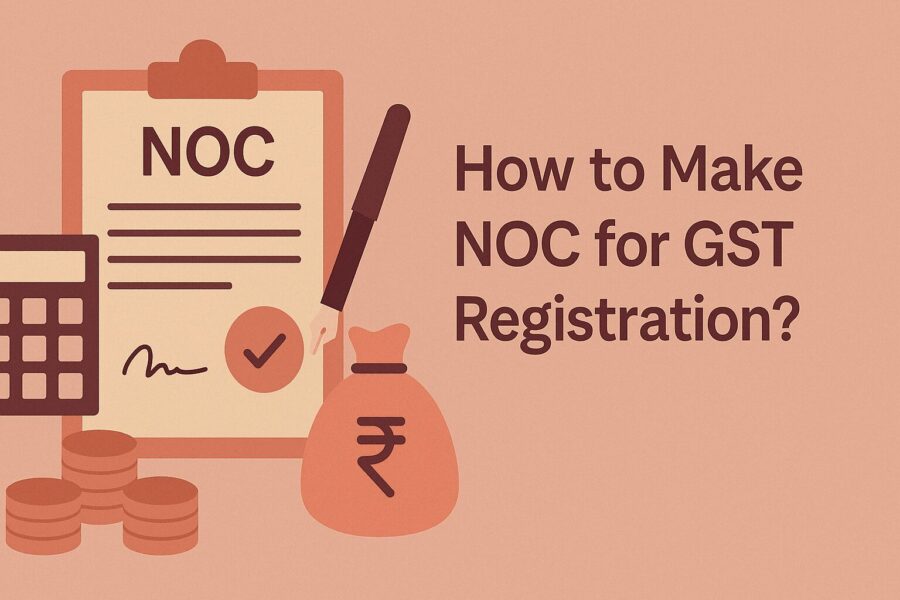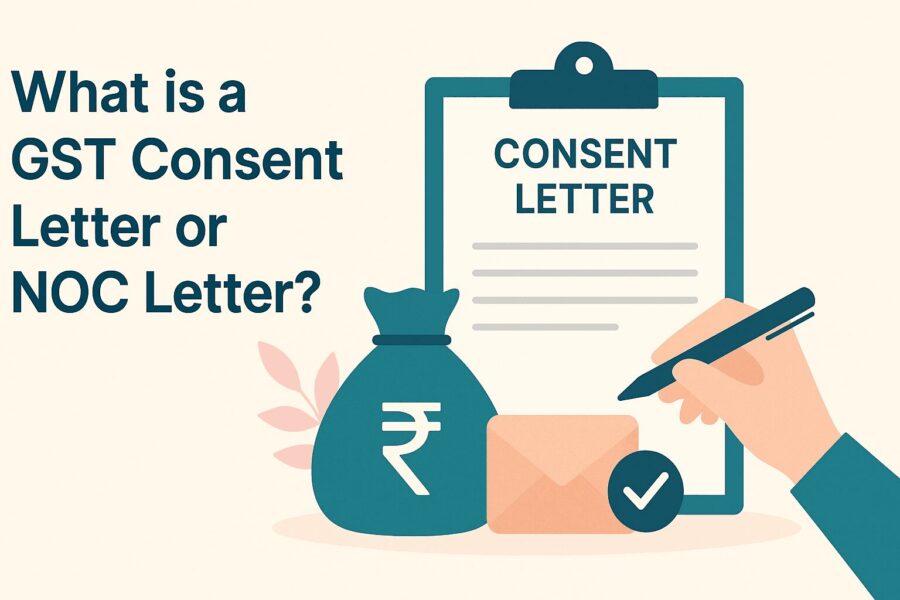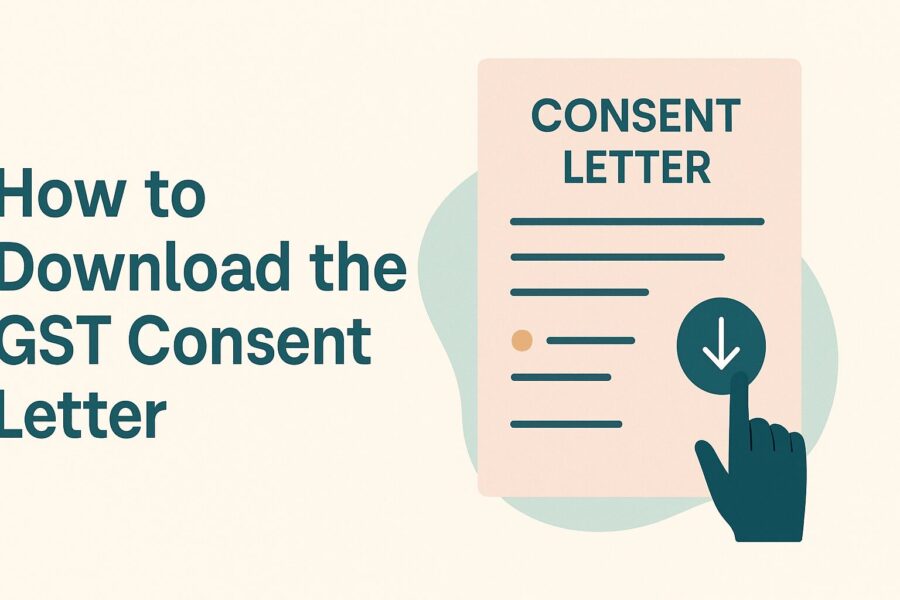How to make NOC for GST Registration?
- 15 Apr 25
- 7 mins

How to make NOC for GST Registration?
- What is a GST Consent Letter or NOC Letter?
- Who is Required to Sign The Letter of Consent?
- Additional Documents with a Letter Of Consent
- How to Upload the Consent Letter
- An Example of a Consent Letter Format
- How to Write an Effective GST Consent Letter?
- How to Download the GST Consent Letter
- What Happens in Case of a Failure to Submit a Consent Letter?
- Conclusion
Key Takeaways
- A GST consent letter is needed if the business doesn’t own the premises.
- It confirms the owner's approval to use the property for business.
- Include names, address, business use, and duration in the letter.
- Attach address proof like utility bills with the letter.
- Missing the letter can delay GST registration.
GST registration is a regulatory requirement for enterprises in India. It assists businesses in becoming acknowledged as reputable suppliers on multiple e-commerce platforms. However, many organisations conduct business remotely with no physical office space.
They must, however, comply with the GST law, which allows them to legitimately collect tax from their customers and pass on their input credit for taxes paid. In such cases, they need to get an NOC for GST registration from the owner of the house where the business is conducted if they don’t own it.
This blog will provide details on what a consent letter is, how to write one, the format, who should sign it, and more.
What is a GST Consent Letter or NOC Letter?

Many companies operate from home because they lack a certified commercial location. When the company registers itself under GST, it must attach a document attesting to its ownership of the property on which the work is being conducted. If the company owner owns the facility, proof of ownership must be given during the time of registration. In a different scenario, where the business owner does not own the place, a GST consent letter, also known as a no objection certificate (NOC), is needed.
It is a formal document certifying the property owner has permitted the company to use their space for business operations. Therefore, the consent letter is an NOC by the property owner stating that he/she has no issues with using the space for conducting business activities. There is no set format for the GST consent letter.
Who is Required to Sign The Letter of Consent?
A GST consent letter or NOC for GST registration is necessary in the following situations:
- Rental or Leased Properties: Companies using rented or leased space must present a letter of approval or lease agreement from the property owner.
- Shared or Co-working Spaces: Businesses utilising co-working or shared office spaces must obtain a consent letter from the direct property owner or management.
- Home-Based Businesses: If a business operates out of a residential residence that belongs to someone else (such as a family member), a consent letter is required.
Additional Documents with a Letter Of Consent
In addition to the GST consent letter, the applicant should include documentation of the business's address, such as a copy of the Municipal Khata or an electric or water bill, to help the GST authorities register the business properly.
How to Upload the Consent Letter
Once the consent letter is ready, upload it by following these procedures during GST registration:
- Visit the GST Portal: After logging in to the GST portal, choose the option for the service > Registration > New Registration.
- Give specifics: Fill out the registration application with your company's information. Statutory: Consent Type of Material Interest in the Premises: Principal Address
- Upload Documents: Upload a scanned copy of the notarised consent letter and any additional required documentation, like proof of residence (such as a property tax receipt or utility bill).
- Send in Your Application: Verify all the information you submitted, and then apply.
An Example of a Consent Letter Format
This is an example of a legitimate consent letter or business address for GST registration:
Certificate of Non-Objection (NOC)
To whom it may concern
This certifies that Mr./Mrs./Miss ___________ (Business Owner Name) has been permitted by ___________ (Owner Name), the owner of the property at ___________(Address), to utilise the space for conducting business.
Furthermore, I affirm that I have no objection to Mr., Mrs., or Miss ___________ utilising the property or location as their postal address and for business purposes. The purpose of this certification is to make GST registration easier.
Sd/- Signature
The owner of the property.
Date:
Location:
How to Write an Effective GST Consent Letter?
A consent letter is required for rented premises for business purposes. Here is what you should include while composing one:
- Clearly define the parties involved: Include the names of the property and business owners.
- Specify the site: Write where the company will operate, including its address.
- Grant approval: Indicate that you, as the owner, enable the firm to utilise the property for commercial purposes.
- Outline the company operations: Clearly describe the kind of organisation that will run from the site.
- Confirm no issues: Indicate that you do not object to the business utilising the property location for GST registration.
- Consent duration: Indicate whether the consent is continuous or for a set amount.
- Contact information: Provide your contact details so that they can be verified. Download the GST Consent Letter.

How to Download the GST Consent Letter
You can download your GST consent letter by clicking here.
What Happens in Case of a Failure to Submit a Consent Letter?
If you are running a business from someone else's property and do not have an NOC for GST registration, you may have to go some extra steps, such as:
- Application Puts on Hold: If you do not have the consent letter, the GST officer can put the registration request and GSTIN on hold. The time required to finish the paperwork and verification procedures may also significantly increase.
- The GST Department's Communication: Because of the incomplete paperwork, the GST department may contact you by phone or email if the letter of consent is absent. You can start the registration process over or request the appropriate documentation.
- Filing the Consent Letter: The jurisdictional officer will evaluate your GST registration application after receiving the legally signed consent letter. You can speed up the registration process by submitting this document as soon as possible.
Conclusion
The NOC for GST registration is a legal document confirming that the premises owner has permitted the business owner to run their company from the property. Hopefully, this blog has helped you understand the crucial aspects of this letter. As it is a mandatory requirement for GST registration, make sure to submit the letter of consent timely with proper signatures, address proof, and clear terms.
You can use the sample letter format from this blog to draft it and then attach it to the registration form.
💡If you want to streamline your payment and make GST payments via credit or debit card or UPI, consider using the PICE App. Explore the PICE App today and take your business to new heights.




















